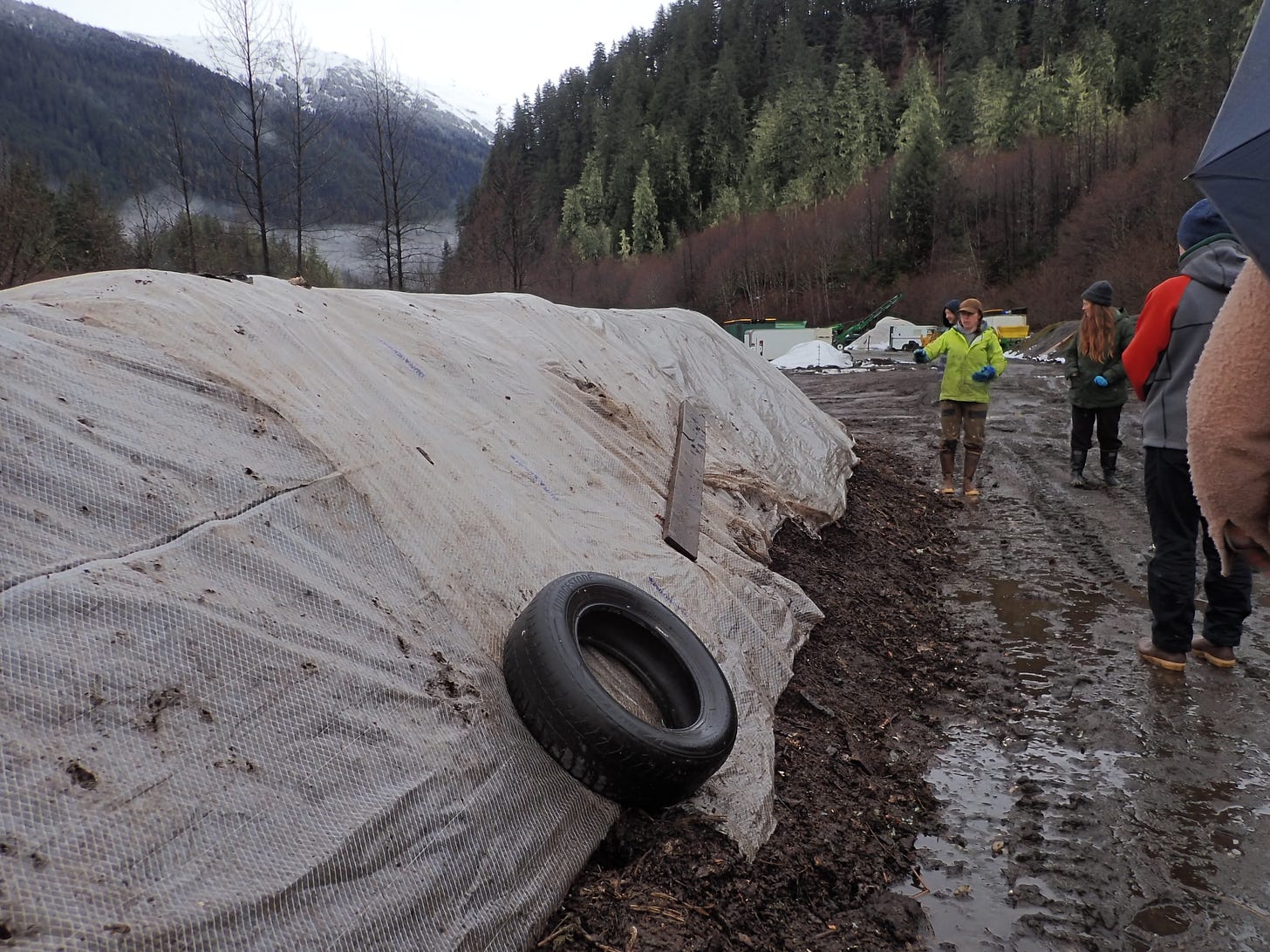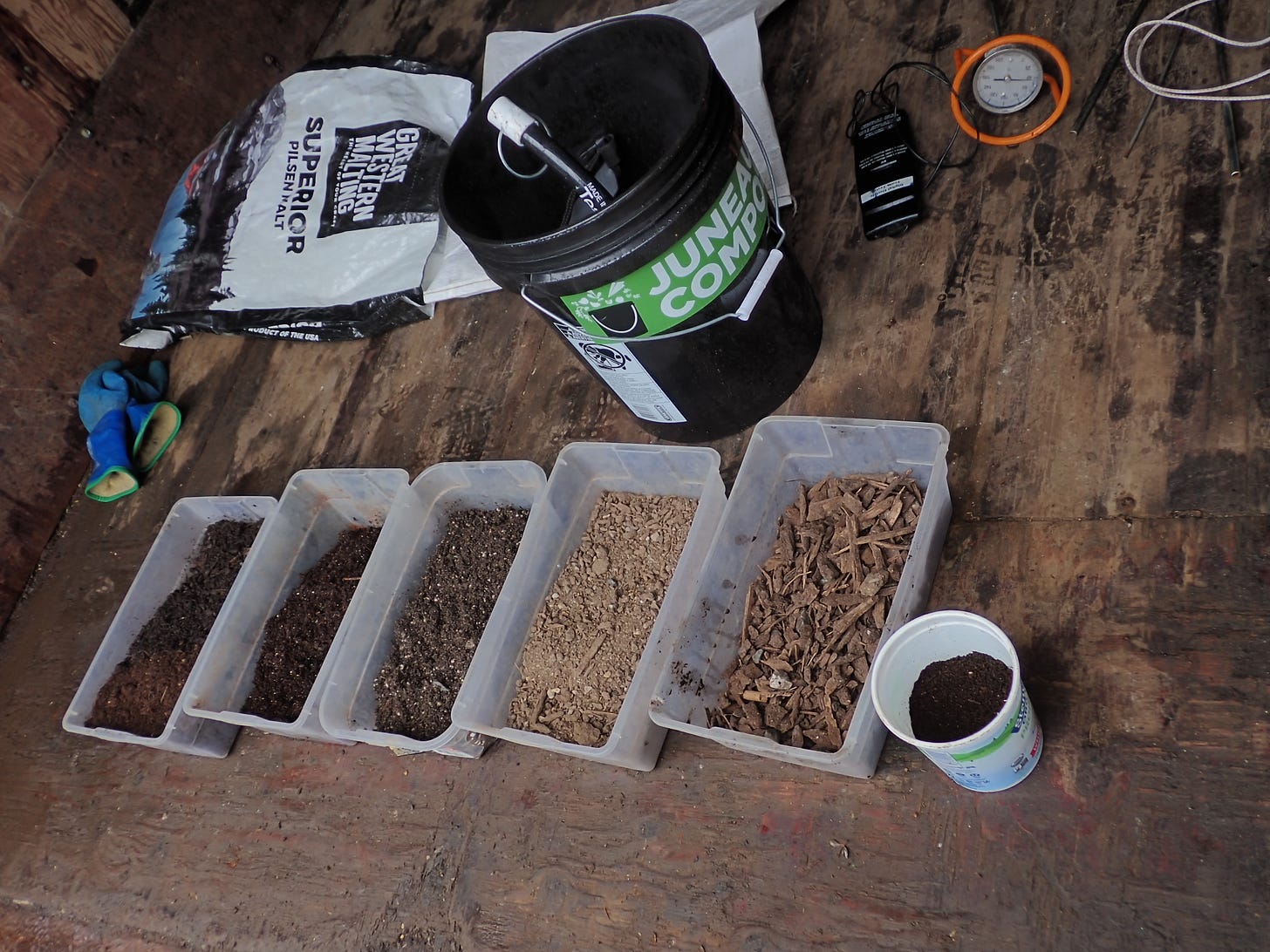Last month I travelled to Juneau, Alaska to speak at the Southeast Alaska Farmers Summit about biochar. I can now say I have been to the ends of the earth where biochar can be used for agriculture. Surprisingly, these disparate locales have some common characteristics.
I am talking about rainforests. In 2010, I got to visit Terra Preta sites just upriver from Manaus in the Brazilian Amazon where the annual rainfall is close to 120 inches a year. In Southeast Alaska the mountains create rain shadow effects, but some areas get more than 100 inches of rain a year.

Lots of water means lots of hydrogen which produces disassociated protons that create acidity or low pH. Acid soils make a lot of important soil nutrients unavailable to plants, nutrients like nitrogen, phosphorus and potassium. Some soils in SE Alaska can have a pH of 5 or less. Soils in the Amazon basin average a pH of less than 5.
The biggest difference between these two areas, besides the latitude and the temperatures, is soil organic matter, which is very related to temperature. Hot temperatures speed up decomposition as microbes get active. Consequently, there is very little carbon in tropical soils. As soon as a leaf falls to the ground, something eats it. Nutrient cycling is super fast as roots immediately grab whatever nutrients become available after bugs and microbes metabolize them and before the rain can wash it away. Almost all of the carbon in a tropical rainforest is in the living biomass. You can start to understand why the Amazonians who wanted to grow corn had to build their Terra Preta soils with recalcitrant charcoal.
In contrast, cold temperatures slow nutrient cycling down to a crawl, as beetles and arthropods work their way through plant detritus it at a sluggish pace. However, what nutrients there are can be retained in the high carbon peaty muskeg soils, despite the constant rain. Mycorrhizal fungi lend a hypha to help plant roots take up nutrients, and the trees and shrubs get by. Growing crops for human food, though, takes a greater effort.
At the SEAK Summit farm tour, I saw a lot of tarps. The small market farms we visited are more like large gardens and are carefully tended by hand. It was winter and the beds had all been put to bed, mulched with the abundant seaweed and covered with tarps to keep out the rain and save some fertility for spring. Farmers do their best to protect the soil they have, but they also need to make more of it, so everyone was singing the praises of Juneau Compost.

Owned and operated by Lisa Daugherty, Juneau Compost is the only source of garden soil in the region. The alternative is to buy bagged products shipped up from the lower 48, or make it yourself. Lisa D. has devoted herself to this Alaska muck since 2017, and her work is much appreciated. The environment she works in is unique not only for its climate but for its social arrangements. Communities are small and inaccessible. Juneau, the state capitol, with a population of only 31,000 has one main road that runs 45 miles along the coast and that’s it. Most of the population lives within a ten mile radius of Juneau Compost and that means it is practical for them to offer an organic waste pickup service.
For a monthly subscription fee, Juneau Compost will pick up a five gallon bucket of kitchen scraps every week. Yard waste is dropped off and the magic of compost turns it all into rich soil. But food scraps are notoriously challenging to compost at scale. Sitting around in the garage for a week, they immediately become putrid, going down a bad microbial pathway that generates volatile fatty acids that give it the typical "garbage can" odor that everyone is familiar with. Juneau Compost charges their commercial customers more for high moisture content waste, because they need to add more carbon to it to fight the putrid anaerobic decay.
Biochar could make this easier. If waste generators in kitchens and restaurants would sprinkle every pound of food waste with a handful of biochar, it would get the composting process off to a good start. A bit of bokashi will help here too so we get something that smells more like pickles than like puke.
When the food waste gets mixed with wood chips and other carbonaceous material and moved into hot composting windrows, the biochar will not only help keep it aerated but will also jumpstart the microbes to make a hotter, faster compost. This could be especially important in cold Alaska with its short summers.

I got a laugh at the SEAK Farmers Summit when someone asked me if biochar was good for both clay soils and sandy soils. I said yes, because biochar opens up clay soils to let them drain better and it holds water in free-draining sandy soils. Then they asked if biochar is equally good in acid and alkaline soils and I said yes because biochar is alkaline and can buffer acid soils and if you compost biochar it will become coated with organic acids that can neutralize it for alkaline soils. “I bet you think I believe biochar is a panacea, right?” That got the laugh. But it is what I believe. And now I am on record that I believe biochar is good for any latitude, whether you are down on the equator or up close to poles.
Speaking of biochar, I had a great conversation with Gardener Scott of Youtube fame last week. Scott knows a lot about biochar and has some very good video instructions for how to easily use it in your garden. We had a fun chat and took a lot of questions. So check it out here:
Please, if you want to learn more about practical biochar tips and tricks for growing your own food, or you are interested in stewardship biochar for restoring natural ecosystems and biodiversity, check out some of my links below:
The Biochar Handbook by Kelpie Wilson
SPRING SALE! $1995 INCLUDES FREE SHIPPING - Order your Ring of Fire Biochar Kiln: RingofFire.earth
Check out my YouTube channel: www.youtube.com/@KelpieWilson






Just bought your book on Amazon. First time I've used Amazon for anything and it felt dirty given Bezos grandad started the cia. Ew.
Still gardening is worth it.
Great info Kelpie. I'm inspired to get char happening this winter!